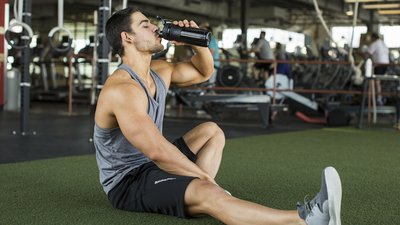We all know the pain that comes after the first leg day in weeks, or following a grueling high-intensity interval training session. Proper nutrition, sleep, and a well-designed training scheme can help you face down the dreaded delayed-onset muscle soreness (DOMS).
Here are a few supplements to help you manage the DOMS and consistently crush your workouts! The faster you can recover, the sooner you can return to your routine.

Branched Chain Amino Acids (BCAAs)
There's a reason BCAAs are in virtually every post-workout product: They work! The amino acids leucine, isoleucine, and valine are important for building muscle and reducing muscle breakdown.
The purpose of hard training sessions is to tax your muscle fibers so they can grow back bigger and stronger. This process can wreak havoc on the proteins that make up your muscle fibers and turn even the simplest activities, like getting out of bed, into mortal struggles.
BCAAs serve as an effective recovery agent, helping to reduce post-exercise muscle soreness and the recovery time needed between workouts.[1,2] A serving size of 5 grams is a fairly universal dose of BCAAs, and can be taken pre-, intra- or post-workout—or any time during the day. Look for BCAAs in a 2:1:1 ratio (Leucine: Isoleucine: Valine).
Fish Oil
Fish oil is one of the most versatile supplements on the market. From supporting a healthy heart to helping with weight management, fish oil is a smart way to help improve your overall health. And when it comes to exercise recovery, this supplement won't disappoint you.

EPA and DHA, two essential fatty acids found in fish oil, have anti-inflammatory properties that help reduce muscle soreness after exercise. In studies using fish oil supplementation, people have reported less pain, less muscle swelling, and a greater range of motion for those taking fish oil instead of a placebo.[3,4] These improvements are most likely due to fish oil's ability to strengthen cell membranes while reducing the oxidative stress that accompanies intensive exercise.
The American Heart Association recommends 1 gram per day of fish oil to support cardiovascular health. If you're looking for help managing DOMS, try a dose of 2 grams (combined EPA and DHA) per day.
L-Carnitine L-Tartrate
More commonly recognized as a fat-burning agent, L-carnitine is emerging as an important supplement for exercise recovery. By decreasing the accumulation of ammonia and increasing blood flow during and after exercise, L-carnitine can help optimize the post-workout tissue repair process.
In one study, resistance-trained men who were given 2 grams of L-carnitine per day for 3 weeks showed significantly less accumulation of markers of post-exercise stress, less tissue damage, and less muscle soreness following moderate-intensity squat exercises.[5]

A follow-up study confirmed these findings, showing that middle-aged men and women who supplemented with L-carnitine experienced significantly less muscle damage and soreness following a high-rep squat protocol.[6]
What could be better than a supplement with fat-burning properties and the ability to reduce soreness?
References
- Shimomura, Y., Murakami, T., Nakai, N., Nagasaki, M., & Harris, R. A. (2004). Exercise promotes BCAA catabolism: effects of BCAA supplementation on skeletal muscle during exercise. The Journal of Nutrition, 134(6), 1583S-1587S.
- Leahy, D. T., & Pintauro, S. J. (2013). Branched-chain amino acid plus glucose supplement reduces exercise-induced delayed onset muscle soreness in college-age females. ISRN Nutrition, 2013.
- Tartibian, B., Maleki, B. H., & Abbasi, A. (2009). The effects of ingestion of omega-3 fatty acids on perceived pain and external symptoms of delayed onset muscle soreness in untrained men. Clinical Journal of Sport Medicine, 19(2), 115-119.
- Jouris, K. B., McDaniel, J. L., & Weiss, E. P. (2011). The effect of omega-3 fatty acid supplementation on the inflammatory response to eccentric strength exercise. Journal of Sports Science and Medicine, 10(3), 432-438.
- Volek, J. S., Kraemer, W. J., Rubin, M. R., Gómez, A. L., Ratamess, N. A., & Gaynor, P. (2002). L-Carnitine L-tartrate supplementation favorably affects markers of recovery from exercise stress. American Journal of Physiology-Endocrinology and Metabolism, 282(2), E474-E482.
- Ho, J. Y., Kraemer, W. J., Volek, J. S., Fragala, M. S., Thomas, G. A., Dunn-Lewis, C., ... & Maresh, C. M. (2010). l-Carnitine l-tartrate supplementation favorably affects biochemical markers of recovery from physical exertion in middle-aged men and women. Metabolism, 59(8), 1190-1199.

